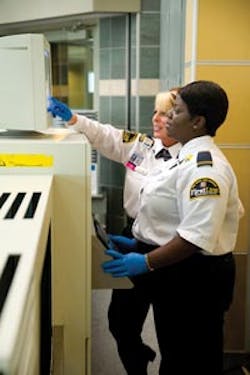The Aviation and Transportation Security Act of 2001 established the Transportation Security Administration as a ubiquitous force in airport security, displacing private screening companies that performed operations at airports prior to Sept. 11. As part of an ATSA provision, TSA launched a pilot program that incorporated private companies to operate at select airports with federal oversight. With the pilot launch, FirstLine Transportation Security Inc. ventured onto the competitive scene and has since expanded its operations to three airports — but the program has yet to gain traction throughout the industry.
Pilot partnership
“ATSA really redefined the whole environment for airport security,” says Gary Smedile, vice president of business development at FirstLine Transportation Security.
Prior to the events of Sept. 11 and subsequent passage of ATSA, private security companies contracted with airlines for screening operations at airports. The creation of TSA changed the landscape of airport security, as it assumed responsibility for operations at about 450 US airports. Private companies have been able to position themselves back into airport security with the advent of the Screening Partnership Program.
SPP was launched as a two-year pilot in 2002 by TSA. It was developed to fulfill the “opt-out” provision that was included to provide eligible airports with the option of integrating private security personnel with TSA oversight. “Per ATSA, TSA provides federal government management and oversight at each airport at which screening services are provided,” TSA spokesperson Carrie Harmon says. “Oversight is ensured by TSA’s federal security directors, who have overall responsibility for airport security and continue to be responsible for overseeing all screening operations and for ensuring that contract companies provide effective and efficient security operations.”
As part of the pilot program, TSA selected five airports. “For the pilot, airports volunteered and TSA selected five, based on a number of criteria and taking into account that we wanted to include airports of various sizes,” Harmon says.
The airports selected were Tupelo Regional Airport, Greater Rochester International Airport, Jackson Hole Airport, San Francisco International Airport and Kansas City International Airport.
The private companies were required to meet federally imposed criteria — the company had to be owned and controlled by a citizen of the US, and the employment standards of private companies had to meet federal employment standards.
FirstLine was selected to operate in Kansas City for passenger and baggage screening services. The company was picked from a list of private contractors. “When TSA first started awarding SPP contracts, we maintained a Qualified Vendor’s List of 34 companies that had submitted acceptable proposals and were eligible to compete for SPP contracts at individual airports,” Harmon says.
The pilot ended in 2004, and TSA opened the program to airports nationwide. “Since November 2004, airport authorities have been eligible under SPP to submit an application to TSA to use private contract screeners,” Harmon says. “All commercial airports with federal security screening are eligible to apply.” In 2006, TSA moved to enhance competition by opening the bidding process to all interested companies that met ATSA requirements, she says.
Since the ending of the pilot program, five additional airports are utilizing the SPP program — Sioux Falls Regional Airport, Key West International Airport, Charles M. Schulz-Sonoma County Airport, Gallup Municipal Airport and Roswell Industrial Air Center. The East 34th Street Heliport in Manhattan has also transitioned into the program.
In addition to its services in Kansas City, FirstLine was chosen to perform passenger and baggage screening at two of the joining airports — Gallup Municipal Airport and the Roswell Industrial Air Center. The company began operations at both New Mexico airports in October 2007.
Quality as a standard
Smedile says the construct of the contracts has provided private companies such as FirstLine with incentive to provide caliber services. “This is a cost-plus-performance award contract so you need to perform in order to earn your money,” he says. “That leads into accountability. There are a whole series of performance metrics that cover the gamut from financial to manpower management to customer service and a lot of other things that you need to perform. You need to measure up to those metrics; in fact, you need to exceed those metrics in order to earn your reward fees.”
Though the company has worked under TSA requirements and oversight, Smedile says the program has afforded room for innovation in terms of staffing. “Because you are a private company, then you can bring to the table the best practices of the industry,” he says. “There is that flexibility and innovation that figures into it. Probably one of the biggest things is the emphasis on customer service, which is a big piece of the accountability.”
A matter of satisfaction
Customer service has been an issue at the forefront of the industry.
FirstLine, which has more than 600 employees at its three locations, has striven for customer satisfaction through its employment procedures. “In the recruitment process and then in our initial training for all of our new-hire transportation security officers and in recurrent training, customer service has specific modules,” Smedile says. “It’s reinforced, daresay on a daily, constant basis. We want to be a positively contributing member of the airport community.”
Customer service has been included in the performance metrics of the SPP contract. “Those would include for example, wait time at check points,” Smedile says. “They also include customer responses, customer comments both positive and negative. If there is a negative, how promptly we respond to it.”
Kansas City International Airport was ranked No. 1 among medium-sized airports for overall passenger satisfaction in the 2007 North America Airport Satisfaction Study by J.D. Power and Associates. “The report itself and the airport acknowledged, recognized that security screening is a major driver of customer satisfaction,” Smedile says. “The airport says ‘one big reason why we got this award is because of the job you guys do for us here at the airport.’ That kind of validates what we’re trying to say and trying to do in terms of customer service.”
Smedile says FirstLine has worked to limit the “hassle factor” for passengers while maintaining optimum security. “There is no trade off,” he says. “You can have high levels of security and high levels of customer service as long as you keep training and emphasizing both.”
Slow to grow
FirstLine Transportation Security Inc. was formed after the acquisition of the management team of International Total Services Inc. — a company that had performed screening and airlines services around the US — by SMS Holdings in 2002. With its subsidiaries already providing facility management and security services in high-traffic establishments, SMS Holdings decided to venture into aviation. “We viewed aviation security as a growth industry over the long term,” Smedile says.
Growth within the program has been slow going. Though FirstLine has expanded its services to three airports through the federal program, Harmon says the expansion does not necessarily indicate an industry trend, as a fraction of the eligible airports have chosen to participate. “All commercial airports in the US have been eligible to apply for the SPP since November 2004,” she says. “Ten are currently participating in the program. TSA’s mission, mandate and fundamental role remains constant regardless of whether the screening work force is comprised of federal or private employees.”
The participation numbers were unexpected by FirstLine, Smedile says. “When this program was first made available nationwide, we thought that the response would be considerably different than it has turned out to be,” he says. “I think one of the reasons is that this is one of the many options that the TSA has in order to meet its security requirements, so there also has to have been a recognition from their perspective as well as ours how this program could be put to good use.”
With passenger volume and airports continuing to grow, Smedile says, TSA has turned to the program as a more viable option. “They have been looking for ways to address all those needs and I think we are now coming to a point where the TSA more readily sees this as another opportunity, an option to use the program to help meet that particular challenge,” he says. “That’s why we are seeing more of an interest all the way around with the smaller airports as opposed to the larger airports, which is where we thought the initial interest would be. Not to say that larger airports are not interested in the program, because they are, we see that around the country but the smaller airports are a good example of where this program is being put to good use.”
There are numerous reasons airports haven’t chosen to participate, according to Debby McElroy, executive vice president, policy and external affairs at Airports Council International — North America. A lack of incentive has proved a major deterrent. “In a survey that we conducted, there were a variety of reasons why the airports were not moving to SPP. Most of the airports were satisfied by the services by TSA,” she says. “The way the program is currently structured, there weren’t advantages to moving to the SPP program.”
Without substantial interest by large airports, the program has gone in a different direction — servicing smaller community airports that have no federal security. “What we’re seeing is SPP transitioning to a program to allow TSA to accommodate new requests for commercial airline service without putting in their own employees,” she says.
Though momentum has been slow for the SPP program, Smedile has remained confident it will continue to grow. “We think that there is a future with the program,” he says. “The TSA seems to show that as well, because of the way they’re increasingly utilizing the program to meet the demands that they have.”

